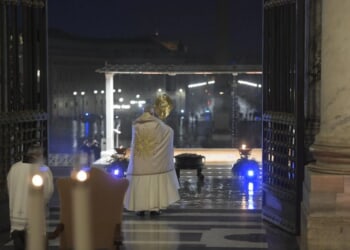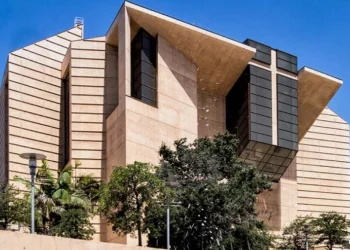Washington, D.C. Newsroom, May 22, 2025 /
15:43 pm
Leaders of several Catholic health care systems in the United States are expressing strong opposition to Medicaid reforms included in the “One Big Beautiful Bill” budget reconciliation measure passed on Thursday morning.
The legislation, which now heads to the Senate, would add Medicaid work requirements for most adults without disabilities or young dependents under the age of 65 starting on Dec. 31, 2026.
If it is adopted, those adults would need to work, volunteer, or attend school at least 80 hours every month, which is 20 hours per week, to qualify for the federal benefit. Current law has no work requirements.
Other changes include more frequent checks on a person’s Medicaid eligibility and reducing federal funds for states that offer Medicaid benefits for immigrants in the country illegally.
The proposals would also prevent states from increasing taxes to cover their share of Medicaid spending and end federal incentives for states with expanded Medicaid.
If the changes are enacted, the federal government could save tens of billions of dollars annually. The proposals could also push millions of people off Medicaid, which reduces the total amount of Medicaid reimbursement dollars received by hospitals.
Catholic health leaders unite against Medicaid changes
The Catholic Health Association (CHA), along with leaders of the health care systems Ascension, Providence, Trinity Health, and SSM Health, have all publicly come out against the proposed Medicaid reforms.
Sister Mary Haddad, the president of CHA, said in a statement that the bill “would harm critical health and social safety-net programs that millions of Americans rely on to live with health, dignity, and security.”
“[CHA] strongly opposes provisions like mandatory Medicaid work reporting requirements, restrictions on state tax authority, and changes to state-directed payment policies — all of which would lead to coverage losses for more than 10 million people who depend on Medicaid for essential care,” she said.
“These harmful proposals threaten the health and stability of the very communities we are called to serve.”
A spokesperson for Providence said in a statement to CNA that Medicaid “is a lifeline for millions of people across the country, including children, seniors, veterans, people with disabilities and pregnant patients.”
“The steep cuts proposed in this bill are deeply concerning and would have a far-reaching and devastating impact on health care if passed,” the spokesperson added.
“Providence continues to advocate for the preservation of Medicaid and urges lawmakers to recognize the integral role Medicaid plays in maintaining the health of our communities.”
Several Catholic health leaders joined a virtual media briefing on Tuesday to voice concerns about the legislation ahead of the House vote.
Eduardo Conrado, the president of Ascension, said during the briefing that about one-third of the funding for Catholic hospitals like Ascension, Providence, and Trinity Health comes from Medicaid and that nearly 9 in 10 of their patients either have Medicaid coverage or are “uninsured or underinsured.”
(Story continues below)
Subscribe to our daily newsletter
“For them and for many others, access to health care depends on decisions being made right now in Washington,” he said. The cuts “will harm real people, they will reduce access to care, especially for those already facing barriers in many states.”
Mike Slubowski, the president of Trinity Health, said it’s not possible to cut Medicaid “without hurting people and weakening our communities.”
“We’ve seen it firsthand,” he said. “When people lose coverage, they skip checkups, they stop taking medications and eventually show up in the ER sicker and in need of more costly care that could have been prevented.”
“That’s not just bad for health,” Slubowski said. “It strains hospitals, overcrowds our emergency rooms, drives up costs for everyone, insured or not. Medicaid cuts don’t just impact those who rely on it. The ripple effect — it will impact everyone.”
Republican leaders defend legislation
Thursday’s budget legislation was partisan, receiving support from most House Republicans and no support from House Democrats. A small number of Republicans opposed the bill or declined to vote on it, mostly based on concerns that it would increase the national deficit and the debt.
Ultimately, it passed the House 215-214 after last-minute lobbying from President Donald Trump himself and a few cost-cutting changes to garner support from members of the House Freedom Caucus.
The legislation includes an extension of the tax cuts from Trump’s first term and additional tax cuts, along with increased funding to enhance border enforcement and the military.
House Speaker Mike Johnson issued a statement that called the bill “nation-shaping legislation that reduces spending, permanently lowers taxes for families and job creators, secures the border, unleashes American energy dominance, restores peace through strength, and makes government work more efficiently and effectively for all Americans.”
“House Democrats voted against all of it — which clearly proves they want tax hikes on their constituents, open borders, and Medicaid for illegal immigrants,” Johnson said.
Kentucky Rep. Brett Guthrie, the chairman of the House Committee on Energy and Commerce, accused Democratic opponents of the bill of trying to “fearmonger and score political points.”
“This bill refocuses Medicaid on mothers, children, people with disabilities, and the elderly — not illegal immigrants and capable adults who choose not to work,” he said last week.
In a post on Truth Social, Trump wrote: “It’s time for our friends in the United States Senate to get to work and send this bill to my desk AS SOON AS POSSIBLE!” He added: “There is no time to waste.”
The legislation needs a simple majority in the Senate, which currently has a 53-47 Republican majority. At least one Republican, Sen. Rand Paul, has said he will not support the bill due to the deficit increase.
Senate lawmakers could also make changes to the bill and send it back to the House.
















